How to Draw a Dirty Room Easy
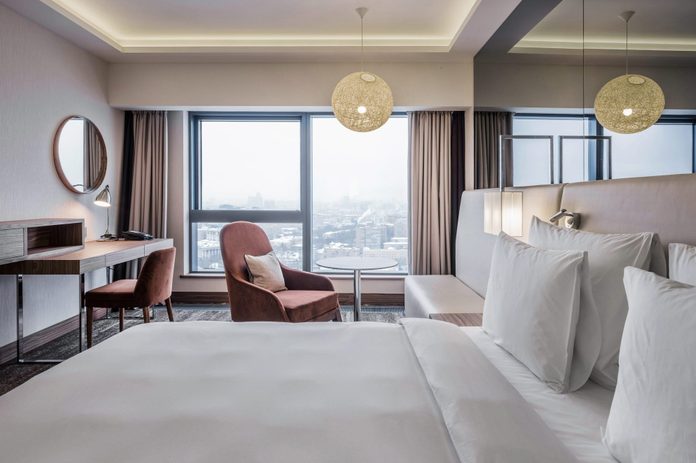
Cleaning is of paramount importance today
Traveling has changed a lot since the COVID-19 pandemic began, and while hotels have amped up their cleaning protocols, it's more important now than ever before to be cautious when staying somewhere other than your home. After all, although a hotel might say it has strict cleaning measures, it might not always put those measures into practice—even if it has a high price tag. "You would think paying more for a hotel would also net you a cleaner room, but investigative reporters have found that not always to be the case," says Jennifer Stagg, MD, a naturopathic physician and the author ofUnzip Your Genes: 5 Choices to Reveal a Radically Radiant You. For example, anInside Edition report from June 2020 found that hotel rooms in three New York City hotels—the Hyatt Place in Times Square, the Hampton Inn Times Square Central, and Trump International—were not cleaned as well as they should have been. The bottom line? Hotels are still doing some gross things to save money.
So, if you're staying in a hotel, you should take a few precautions. Make sure to wipe down hard surfaces as soon as you get into the room, and be wary of soft surfaces that can't be disinfected easily. Because of this, you might want to pack these unexpected things for a vacation during the pandemic. You should also pay particular attention to the following 12 spots in your room where germs tend to fester.
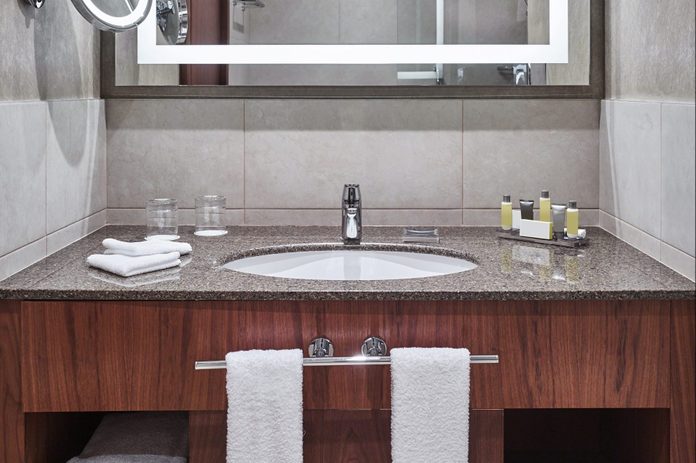
Bathroom counter and faucet
Prior to the pandemic, the biggest concern was getting sick from toilet germs spread around the bathroom. While that could still be a problem, now we also have to worry about the risk of COVID-19. A September 2020 study from the journalEmerging Infectious Diseases found COVID-19 germs on surfaces in uncleaned hotel rooms where guests who later tested positive for the disease had stayed. One of the hot spots? The faucet.
Other germs are still an issue, as well. "The bathroom counter and faucets can sometimes be cleaned with the same cloth used to clean the toilet, thereby transferring germs from fecal matter onto the counter and faucets," explains Dr. Stagg. "This can lead to gastrointestinal infections. There may also be GI and respiratory viruses lingering on surfaces." Today, these viruses may also include COVID-19. Worse yet, the same cloths may be used from room to room. FYI, here's how professional house cleaners can tell if a hotel room is clean.
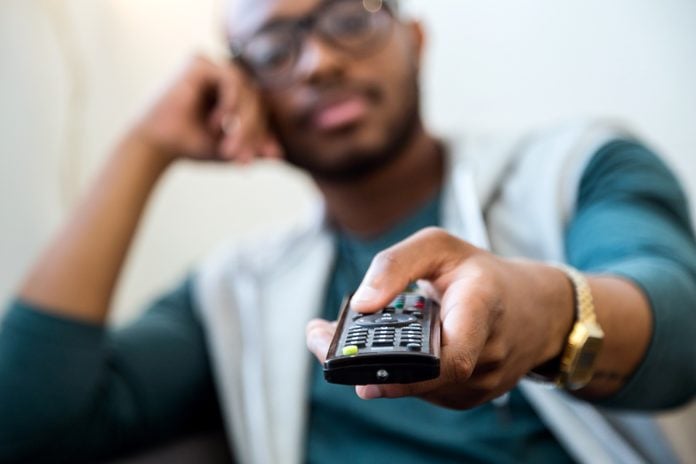
Remote control
Some hotels, such as those in Hilton's Clean Stay program, specifically say that high-touch surfaces including the TV remote are thoroughly cleaned, but are they really? The 2020Inside Edition report found that in the hotels they investigated, TV remotes were not always cleaned. And in addition to COVID-19, "E. coli can be a problem on TV remotes from hotel guests not washing their hands after going to the bathroom," says Dr. Stagg. Tip: Cover your remote with a thin plastic bag (such as a Ziploc) to turn the TV off and on and to change channels.
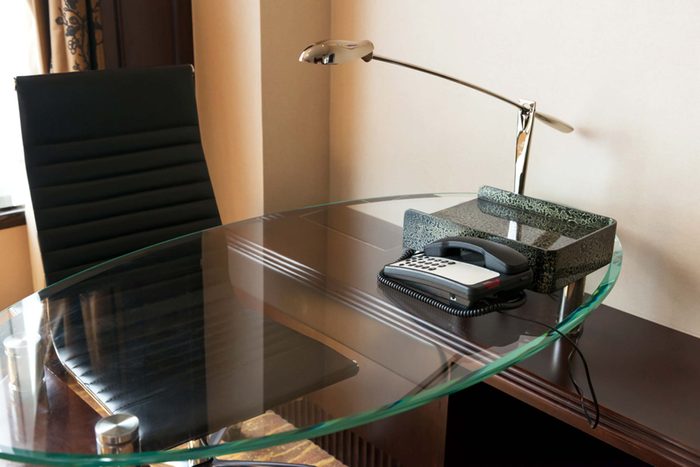
Desk
In hotel rooms, you can commonly find respiratory viruses lingering on desks, says Dr. Stagg. This includes COVID-19, which may remain on wood surfaces for up to four days—although whether there would actually be enough of the virus left to make you sick days later is debatable. Still, it doesn't take much effort to wipe down the surface of the desk, just in case. Clean your work area with a sanitizing wipe before you set down your laptop and important papers—and definitely before using it to eat on. Also make sure to wash your hands after touching it.
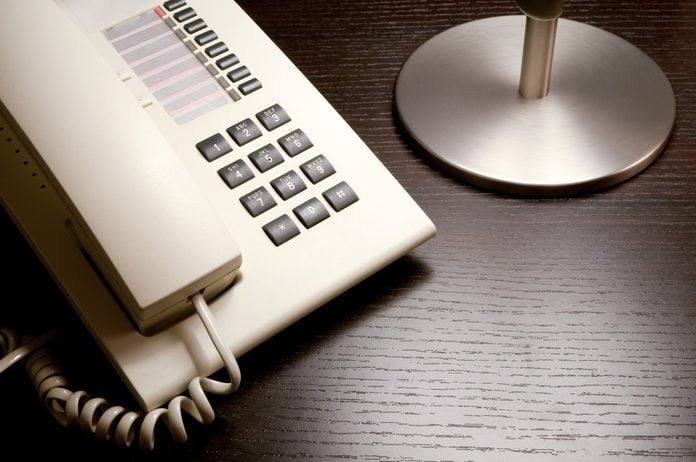
Phone
Here's one that will surprise absolutely no one! Hotel room phones are a magnet for germs, as you put it up to your face and extremely close to your mouth. With the risk of COVID-19 (not to mention other germs), it's best to skip using the room phone completely—or if you have to use it, put it on speaker. In addition to COVID, "MRSA has been found on phones and remotes, which can cause dangerous skin infections," says Dr. Stagg. "Phones can also have E. coli and respiratory viruses from people holding the phone near their mouth and face." Don't miss these warning signs you're about to stay in a bad hotel.
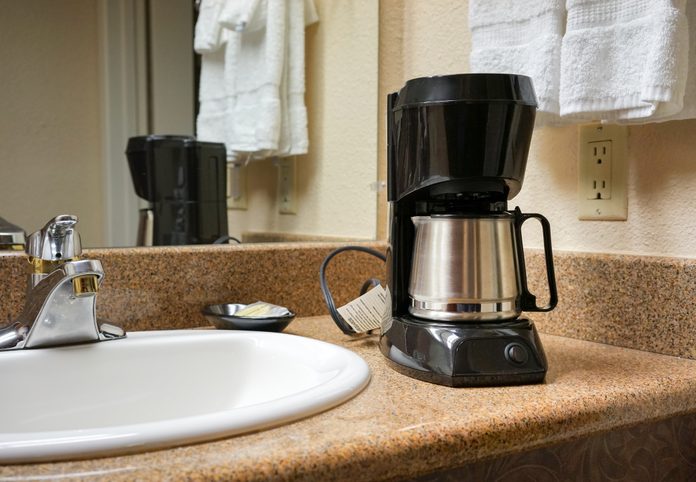
C offee maker
Coffee makers can harbor mold and respiratory viruses, according to Dr. Stagg. In one pre-COVID study published inScientific Reports, researchers from the University of Valencia found bacteria in nine Nespresso machines that had only been used for a year. Many in-room coffee makers have actually been removed for COVID safety, but if your room has one, it's best not to use it and instead head to the hotel lobby for that morning cup of joe. Although shared coffee dispensers in the lobby may also no longer be available as per new industry guidelines, you'll probably be able to score a coffee to go. Or, bring your own portable French press for your room.
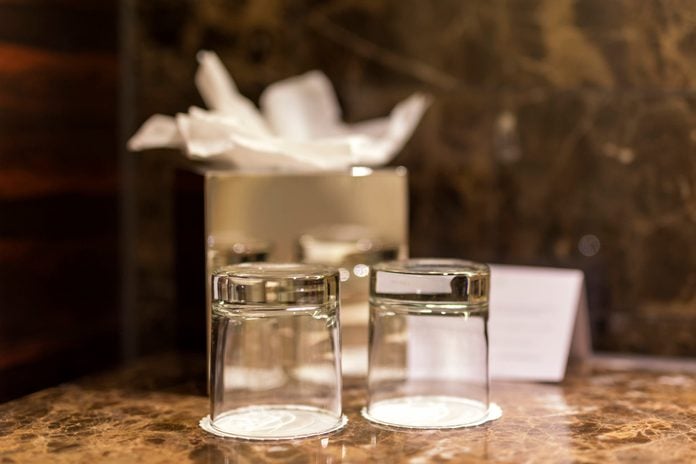
Bathroom glasses
Even with today's stricter cleaning protocols, you can never be sure if those glasses in the bathroom have been washed properly. Previously, Logic Products founder Jill Taft says that the cleaning staff often just rinsed the glasses in the bathroom and minibar with water. Although we can hope things are different now, this is another case of better safe than sorry. Then again, you might not even find glasses in guest rooms anymore, as many chains are eliminating them or replacing them with disposable, single-use cups. Check out more common things you won't see in hotels anymore.
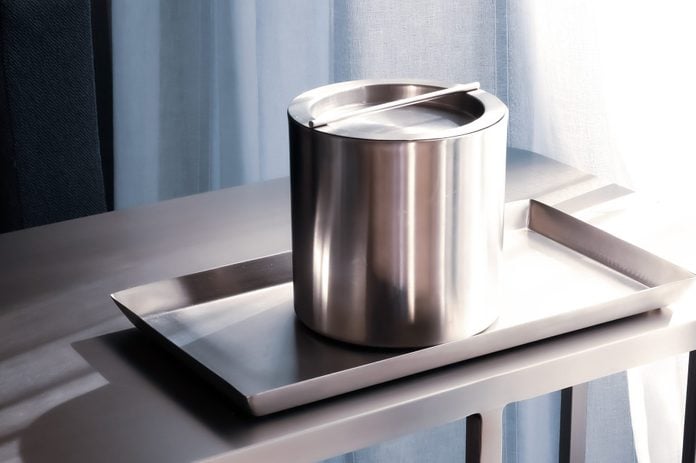
Ice buckets
Nope, not even your ice is safe! In fact, Dr. Stagg notes that hotel ice buckets can contain a host of germs, including norovirus from guests who may use it as a vomit basin (which happens more than you'd care to imagine). Even today, they may not be cleaned as often, or as well, as you'd expect. Again, though, ice buckets are another item that is making its exit from hotel rooms in light of COVID-19. But if you happen to find one in your room, it's best not to use it—or at least line it with your own bag first. See which other amenities have been slowly disappearing from hotel rooms.
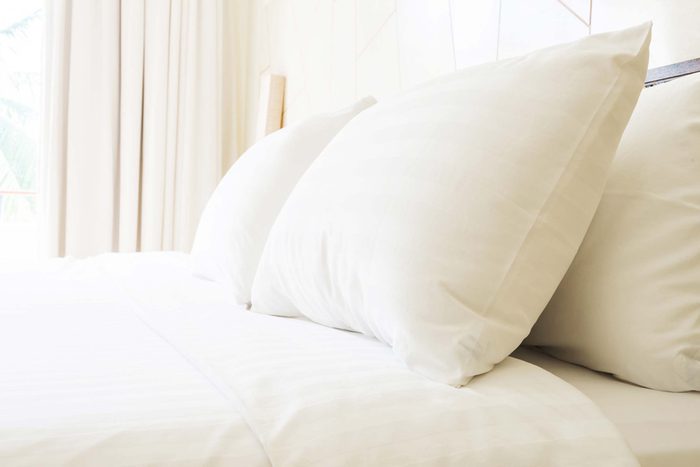
Comforter and pillows
The bed is pretty much the most important item in a hotel room, so you'd expect it to be thoroughly clean in the age of COVID-19. TheEmerging Infectious Diseases study highlighted the importance of this, as it found COVID germs on the uncleaned bedding of infected guests, with the highest viral load on pillowcases and sheets. Yet the 2020Inside Edition report found that the bedding in the hotel rooms investigated was not always changed. In addition to COVID, "organisms that cause sexually transmitted diseases can be found on bedding, including comforters and pillows that aren't washed," says Dr. Stagg.
Although Hilton's CleanStay policy specifically states that duvet covers, along with other bedding, is washed between guests, check with your hotel if there's any question about how often bedspreads are cleaned. Plus, "always call housekeeping for extra clean pillowcases so you can change them yourself," Dr. Stagg says. Or, just bring your own pillow and pillowcase. Taft adds that it's important to beware of the cleaning staff throwing pillows on the floor while making the bed; if your bed has throw pillows, remove those as soon as you arrive.
RELATED: These Hotels Have Handled COVID the Best
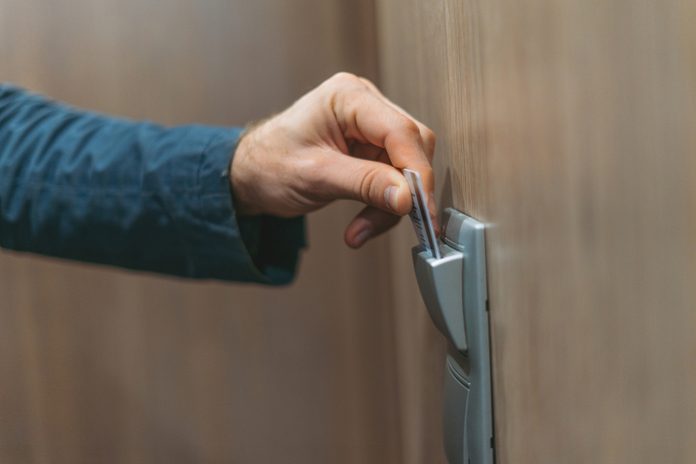
Room keys
Here's one thing you touch multiple times a day as a hotel guest and never thought twice about until now: your room key card. Prior to COVID, "these [were] never disinfected, so they [had] just as many germs on them as money does," Taft says. "Consider wiping all room key cards down ASAP." Nowadays, industry standards and the CDC recommend disinfection of key cards between guests, although you should still do your own wipe-down. But if mobile check-in and mobile keys accessed through your cell phone are offered, definitely take advantage to reduce your risk further.
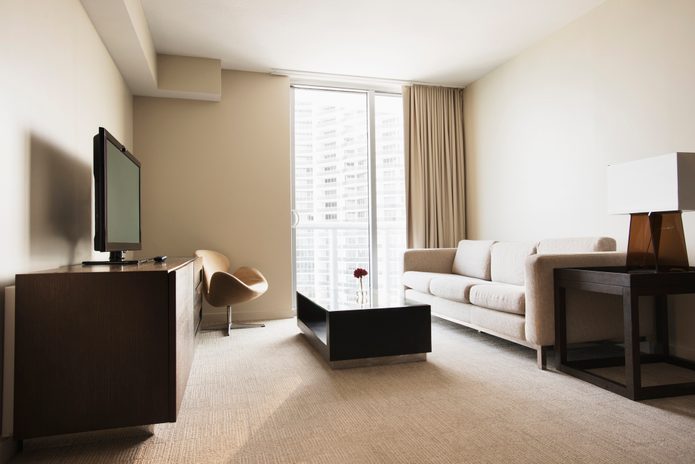
Sofa and chairs
Stains from bodily fluids—which aren't always visible to the naked eye—can harbor a variety of viruses and bacteria. And unfortunately, soft surfaces like sofas and chairs are some of the hardest things to keep clean. After all, it's not like you can just throw them in the washing machine. "[Germs are] commonly found on fabric that is not easy to clean thoroughly," says Dr. Stagg. But fortunately, in the case of COVID-19, it's likely that the virus doesn't survive as well on upholstered surfaces as it does on hard surfaces. Still, you could spray them down with Lysol, which has been proven to kill coronavirus, just in case.
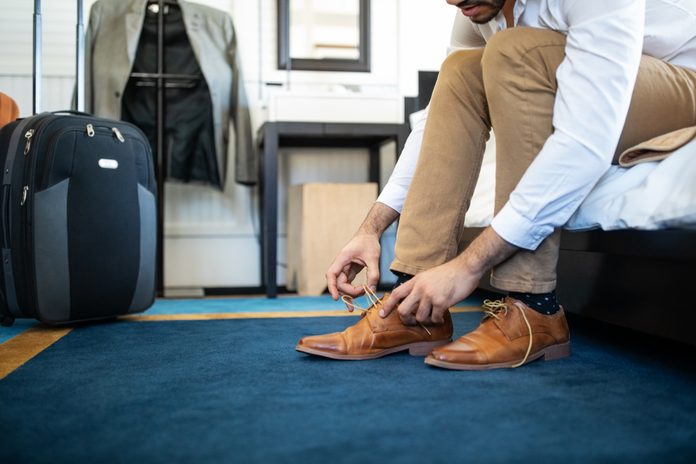
Carpets
Even if housekeeping thoroughly vacuums between guests according to COVID guidelines, they are probably still not actually cleaning the carpets after each use—and germs may linger there. Even though the CDC recommends cleaning carpets and rugs, they don't specify how often to do it. Plus, besides COVID, other nastiness could be brought in on shoes and suitcase wheels from multiple guests. "Carpets are breeding grounds for bacteria and germs," says Taft. "Never let your kids sit, lay down, or play on the carpet, and always wear socks or slippers." Here are a few more things you probably shouldn't do in a hotel room, either.
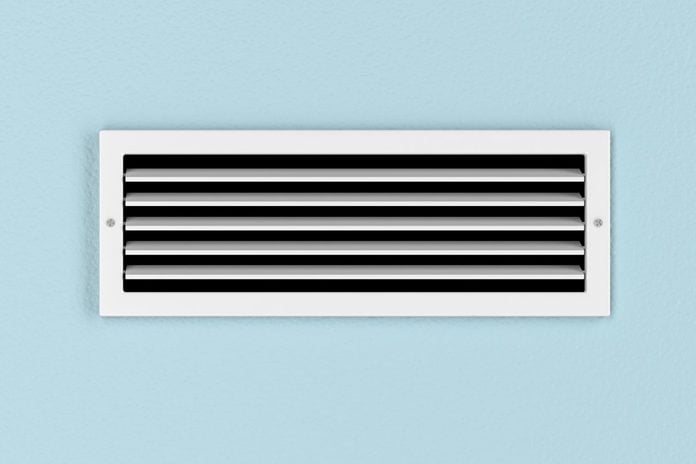
Air vents
Although we've focused on the dirtiest surfaces in hotel rooms, the air in your room may be the most dangerous thing you encounter. Research now shows the primary way the virus spreads is through the air, with transmission from surfaces secondary. Although most airborne transmission is through close contact, it's possible that inadequately ventilated buildings could be culprits as well. The CDC gives guidelines for improving and maintaining HVAC ventilation and HEPA air filtration systems to reduce the spread of COVID throughout buildings, so if you have any questions about whether the ventilation is up to date, ask hotel management.
Plus, in addition to COVID, "air vents can contain mold, which can cause respiratory problems," says Dr. Stagg. If your hotel room windows open, do so as soon as you get in the room to air the place out. To be extra safe, you might also want to bring along a portable air purifier.
Sources:
- Jennifer Stagg, MD, author ofUnzip Your Genes: 5 Choices To Reveal A Radically Radiant You
- Inside Edition: "Investigation Finds Sheets Weren't Changed Between Guests at Some New York Hotels"
- Emerging Infectious Diseases: "Detection of Severe Acute Respiratory Syndrome Coronavirus 2 RNA on Surfaces in Quarantine Rooms"
- Cleveland Clinic: How Long Will Coronavirus Survive on Surfaces?
- Scientific Reports: The coffee-machine bacteriome: biodiversity and colonisation of the wasted coffee tray leach
- Jill Taft, Logic Products
- Johns Hopkins: "Coronavirus (COVID-19): Frequently Asked Questions"
- EPA: "EPA approves first surface disinfectant products tested on the SARS-CoV-2 virus"
- CDC: How Covid-19 Spreads
- American Hotel & Lodging Association: Enhanced Industry-Wide Hotel Cleaning Guidelines
Originally Published: March 11, 2021
Source: https://www.rd.com/list/dirty-hotel-room/
0 Response to "How to Draw a Dirty Room Easy"
Post a Comment